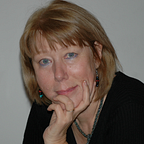Is the world in the hands of fools?
“Knowledge is a deadly friend if no one sets the rules”. This sentence comes from my favorite songwriter, Peter Sinfield, co-founder and lyricist of King Crimson, a progressive rock band who emerged at the end of the sixties. Epitaph is the name of the song, and it tells us about the confusion and despair of the writer seeing the world heading to its end, due to the wrong use of knowledge, which is, according to his words, “in the hands of fools”. Epitaph is written as a poem, but expresses the sense of sorrow and powerlessness of Sinfield, as he recites: “Confusion will be my epitaph” or “I fear tomorrow I’ll be crying”.
I discovered this song long after it was released, when I was in high school. As I was reading George Orwell’s “Nineteen Eighty Four” or Aldous Huxley’s “Brave new world”, the lyrics made particular sense, since both of them were dystopian fictions resulting from the taking over by those that Sinfield called “fools”. I ended up learning the song by heart, and many years after, it is still somewhere in the back of my mind and kicks around from time to time on the occasion of some event, or while watching the news on TV.
Bertrand Russel, a British mathematician, philosopher, and Nobel Laureate, said: “the world history is the summary of everything that could be avoided”.
Trying to list all the foolish decisions made by those who are supposed to make the best use of knowledge to exercise power would be too long, but we can pinpoint some of the most critical.
To start with a recent one, President Trump’s efforts to dismantle the Affordable Care Act and thus trying to deprive Americans of healthcare coverage, while millions of them are sick with Covid and struggling with unprecedented economical consequences.
Following on the Covid topic, irresponsible management from some country leaders who started with denying or minimizing the problem and thus were slow to develop an efficient pandemic response, leading to an excess of fatalities.
Going back a bit further, and still on the theme of foolish decisions with a huge impact on human lives, Nixon’s way to get America out of the Vietnam war by bombing and invading Cambodia, killing 700000 civilians, outside of the light of Congress and public scrutiny.
Misuse of knowledge in science can also turn into a threat to humanity. If this knowledge falls into the wrong hands, it can lead to disaster in no time. Good examples are the invention of the nuclear bomb or Alfred Nobel’s TNT. Artificial Intelligence as well, if not used for human welfare, can get out of hands and wreak havoc on society.
And what about the human greed that leads industrialists to plunder the resources of the poorest countries and starve their population? Not to mention those who enslaved those populations based on their skin color.
But the worse ones are those dictators, who kill in the name of an ideology, whether political or religious, because they are certain to hold the truth and want it to rule the world. That leads to fanaticism, terrorism, of which we see many examples all over the world. As Bertrand Russell said, “fools and fanatics are always so certain of themselves”, and that makes them difficult to challenge by wiser people who try to genuinely assess pros and cons to reach a decision.
So yes, knowledge is dangerous, if no one sets the rules. As Albert Einstein once said: « Any fool can know, the point is to understand.”
